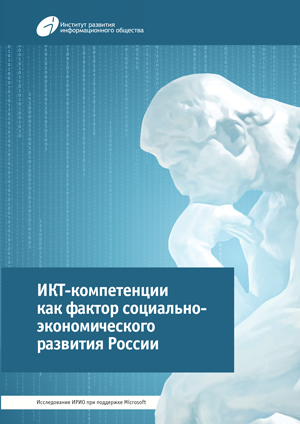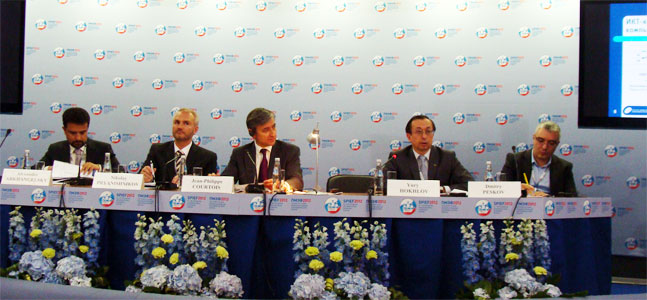|
 On
June 21, 2012 at the press-conference within the framework of the Petersburg
International Economic Forum 2012 Institute of the Information Society (IIS)
and Microsoft announced the results of research on “Role of ICT Competences in
Social and Economic Development of Russia”. In the course of discussion
attended by representatives of the state and the expert community there were
presented the results of the most recent researches on the level of ICT
ingression in Russia, skills and needs of citizens in using contemporary
technologies and ICT competencies impact on innovative development of economy
and social sphere as a subcomponent of country’s human capital. Besides experts
discussed the significance of development of knowledge and skills of Russians
in ICT sphere and results of two and half years of Microsoft “Your Course”
program aimed at increasing computer literacy. On
June 21, 2012 at the press-conference within the framework of the Petersburg
International Economic Forum 2012 Institute of the Information Society (IIS)
and Microsoft announced the results of research on “Role of ICT Competences in
Social and Economic Development of Russia”. In the course of discussion
attended by representatives of the state and the expert community there were
presented the results of the most recent researches on the level of ICT
ingression in Russia, skills and needs of citizens in using contemporary
technologies and ICT competencies impact on innovative development of economy
and social sphere as a subcomponent of country’s human capital. Besides experts
discussed the significance of development of knowledge and skills of Russians
in ICT sphere and results of two and half years of Microsoft “Your Course”
program aimed at increasing computer literacy.
According
to the results of the research conducted by IIS the level of ICT competence of
Russians today is behind European indexes but this gap is rapidly decreasing.
Since 2008 the difference in proportions between internet users in Russia and
European countries (EU) decreased more than twofold. At the same time a
significant lag is still visible both in quantitative (amount of computers per
head), and qualitative sense (how the technologies are used, electronic public
services, etc). Today in Russia 58% of the population use computer at least
once a week, whereas in EU it is 69%. Approximately the same is the balance
between internet users: 56% in Russia and 68% in EU.
“Russia is one of strategically crucial
countries on the world arena, center of innovations, economic growth and
entrepreneurship talent. – We are proud with the input in Russian innovative
economy, particularly in developing human capital and ICT competences and
realizing Russian citizens’ potential”, said Jean-Philippe Courtois, President
of Microsoft International.
Youth
is certainly the leader in ICT use in Russia. The share of users working with
computer on a daily basis among young people aged 16-24 is 87% (92% in Europe),
and in a senior group aged 55-74 only 18% use computers (42% in EU).
At
the same time the need for technologies’ use for solving personal and
professional problems is quite high among modern Russia’s citizens. ICT
competences are more and more required for employment purposes: 10 years ago
ability to use computer or internet was mandatory for a potential employee only
in 7% of cases, but now this index increased to 30%. Also Russian residents
demonstrate interest and call for electronic public services: 42% of adult
population consider internet to be the most convenient way of communication
with public authorities.
“Development
of ICT competences is a key goal of the information society. It cannot function
without them. ICT knowledge and skills become the most important part of human
capital, which in postindustrial times is the accelerator of social and
economic development and increase in competitiveness of the country”, –
explains Yuri Hohlov, Chairman of the IIS Board of Directors. – “Today the
level of ICT ingression in Russia reached the threshold when positive influence
on economy and life is visible”.
 According
to expert evaluation the leading role in ICT competences’ development is played
by programs of increasing computer literacy. This is proved by the researches:
48% of people, who ever had special training, feel fine working with computer
and can carry out the majority of basic operations, whereas among people, who
never took any computer courses, there are only about 17% of experienced users. According
to expert evaluation the leading role in ICT competences’ development is played
by programs of increasing computer literacy. This is proved by the researches:
48% of people, who ever had special training, feel fine working with computer
and can carry out the majority of basic operations, whereas among people, who
never took any computer courses, there are only about 17% of experienced users.
One
of the most efficient programs aimed at increase of computer literacy is the
Microsoft “Your Course” initiative, which was launched in Russia in February
2010. In total in 2010-2012 about 700 thousand citizens of Russia obtained
support within the framework of this project in forms of consultations and
trainings, including more than 200 thousand people, who completed computer
literacy courses. Training seminars and courses were conducted in 100 towns of
Russia by 120 partner organizations – participants of the project.
The
survey allowed estimating the contribution of the “Your Course” project in the
development of ICT skills of Russian citizens. 2.6% of those, who had computer
trainings in the past 3 years, did this in the course of Microsoft initiative.
IIS researches also confirmed high recognizability of this initative among
population: according to polling the recognizability of the “Your Course”
program among people aged 16-74 is 16%.
“Such
programs do not only increase personal professional level of each person but also
affect the economic growth, increase of competitiveness of the country. Thus in
2012 we ascended to the 56th position in the Global Innovation Index
(in 2008 we had the 68th position). Russia shows positive dynamics
in development of knowledge economy, which in the charted course and thanks to
educational initiatives will provide for increasing labor capacity at the world
level”, – says Dmitry Peskov, Director of “Young Professionals” trend of the
Strategic Initiative Agency.
The details of IIS research are available at http://e-competences.iis.ru (in Russian), executive summary –
at http://www.iis.ru/docs/e-Competences_Executive_Summary.pdf
(in English). |

